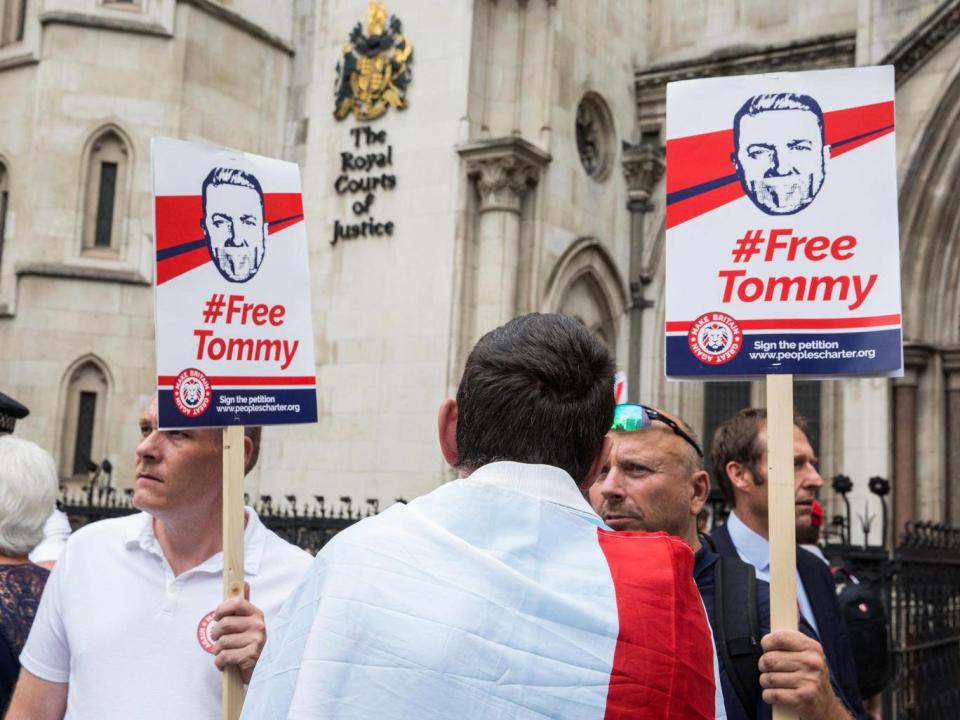Tommy Robinson lawyers appeal for far-right leader to be freed from prison because of 'procedural deficiencies'
Tommy Robinson's lawyers have argued that the far-right leader should be released from prison because of “procedural deficiencies” in two court cases.
The Lord Chief Justice and two other judges have retired to consider calls for them to quash his 13-month-jail sentence and findings that he committed contempt of court in Canterbury and Leeds.
The Rt Hon Sir Ian Burnett, Mr Justice Turner and Mrs Justice McGowan DBE told a packed courtroom they would “do their very best” to reach a decision by the end of July.
Robinson watched proceedings via a video link from prison. He laughed to himself and shook his head as the judges retired to consider their judgement.
More than a dozen of his supporters waved at him through the feed before they were ordered to leave the courtroom, while a small group of “Free Tommy” protesters carrying signs and flags gathered outside the Royal Courts of Justice.
Police officers kept a watchful eye on the demonstration, with back-up stationed nearby following outbreaks of violence at two recent protests in support of Robinson in London.
He spoke only to confirm his real name, Stephen Christopher Yaxley-Lennon, during the hearing.

His barrister, Jeremy Dein QC, called on the judges to overturn contempt findings from May 2017 and May 2018 and to order Robinson’s release.
“There have been a conglomeration of procedural deficiencies that have given rise to prejudice and should lead to both findings being quashed,” he told the court.
Robinson was handed a three-month suspended sentence for attempting to film defendants at Canterbury Crown Court during a rape trial, which was activated and lengthened after he violated a blanket reporting restriction at Leeds Crown Court in May.
Judge Geoffrey Marson QC said he admitted committing contempt of court in a Facebook Live video, which was broadcast for more than an hour and watched 250,000 times within hours of being posted.
The Court of Appeal heard that footage of Robinson discussing the ongoing case caused jury deliberations to be paused, sparking an attempt by defence lawyers to have jurors dismissed.
Mr Dein said that because the application was unsuccessful “there was no impact on the ongoing trial”.
But the Lord Chief Justice replied: ”It's important to at least acknowledge that it had an impact.”
Robinson’s barrister argued that although the judge was right to immediately order the video be removed from Facebook, he should have adjourned contempt proceedings against Robinson to give him more time to consult with lawyers.
He was arrested at around 10.45am, did not get legal representation until midday and the hearing that saw him handed a “manifestly excessive” prison sentence started after lunch, Mr Dein said.
He argued that proceedings were “unnecessarily and unjustly rushed”, causing Robinson’s representative at the time to miss potential mitigating factors that could have lowered his sentence.
Asked to confirm whether Robinson admitted contempt, Mr Dein said his barrister in Leeds “made a number of concessions” and said Robinson was sorry.
But he argued that the matter was not “properly addressed” and that detailed allegations over how the defendant committed the crime were not put to him in a way that allowed a full response.
“He did not intend to breach any [reporting restriction] order, albeit that he was aware that there was an order,“ Mr Dein told the court, claiming that Robinson was “operating as a journalist” and attempted to be legally vigilant.
“When the matter was brought to his attention he immediately showed willingness to address any damage he may have done.”
Mr Dein revealed that Robinson attended media law training with other members of the right-wing Rebel Media website, who he worked for at the time, in June 2017 and said he was trying to become an “investigative journalist”.
Louis Mably QC, an independent barrister appointed by the Attorney General to assist the court, said judges must ask if any of the alleged procedural failings ultimately affected the finding that Robinson had committed contempt of court.
He said the case was a question of “substance not form”, adding: “There is nothing in the rules to suggest an order or finding of contempt is invalidated if a particular aspect of the rules is not complied with.“
Mr Dein refuted his argument and said an "error" in the way proceedings in Leeds were labelled meant Robinson was treated as a criminal rather than a civil prisoner, who are allowed more access to visitors and other privileges.
The barrister claimed he was being held in effective solitary confinement at HMP Onley, with limited access to telephones, visits, his three children and rehabilitation activities.
But he acknowledged that the restrictions were imposed in “good faith” to protect Robinson from potential attacks by other prisoners.

The appeal has been launched outside the 28-day time limit for challenging convictions, but was allowed because of delays to legal meetings.
It came a day after reports that lobbying by the far-right Breitbart news website caused the US ambassador for international religious freedom to raise Robinson's case with the British government.
US Senator Sam Brownback reportedly told British ambassador Sir Kim Darroch the UK should be more “sympathetic” to the former leader of the EDL and warned Sir Kim that the Trump administration might publicly criticise its handling of the case.
Robinson has been forming links with the American alt-right, who characterise him as a “citizen journalist” and see his imprisonment as a violation of freedom of speech.
A neoconservative US think-tank said it was funding both Robinson's legal costs and two protests in London on 9 June and 14 July.
The June protest saw Robinson supporters perform Nazi salutes and attack police, while the weekend vent - which merged with a pro-Trump march - saw demonstrators blockade a bus driven by a Muslim woman and several arrests.

 Yahoo News
Yahoo News 
